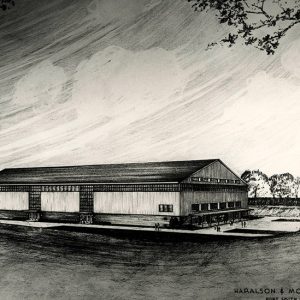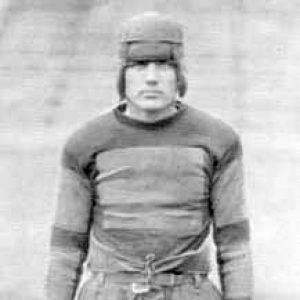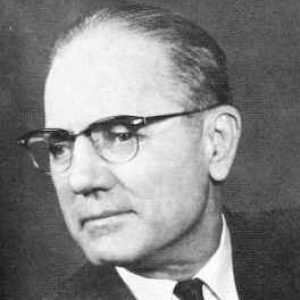calsfoundation@cals.org
John Henry "Barnie" Barnhill (1903–1973)
John Henry Barnhill was a successful head football coach both at the University of Tennessee in Knoxville and University of Arkansas (UA) in Fayetteville (Washington County) but left the most lasting imprint in Fayetteville as UA’s athletic director.
John Henry Barnhill was born on February 23, 1903, to James Monroe Barnhill and Margaret Alice Bryan in Savannah, Tennessee. His parents were farmers. Barnhill’s services were so greatly required on the family farm that they caused an interruption in his attending high school. He graduated from Savannah High School in 1923. He was nineteen when he enrolled at Memphis State University (now the University of Memphis) in 1923. He transferred to the University of Tennessee in 1924 and excelled as a football player under a coaching legend, General Robert Neyland. Life on the farm cultivated college incentives. “I did a lot of thinking,” Barnhill was quoted. “I decided I didn’t want to spend my life behind a plow.”
A standout athlete in Savannah, Barnhill was small for a football player even by 1920s standards, yet he proved ideal as a lineman for General Neyland’s Tennessee tactics. Players had to have endurance since they played both offense and defense. Neyland’s offensive guards had to be mobile for all the pulling they did while leading sweeps in the single wing. Barnhill played offensive guard and, on defense, was a middle guard. He lettered in 1925, 1926, and 1927 and was a senior team captain in 1927. He was named to the All-Southern Team and starred for Tennessee teams that went 8–0 and 8–0–1 in 1926 and 1927, respectively.
In 1928, Barnhill graduated from Tennessee. He stayed in his home state, becoming the high school head coach at Bristol and compiling a three-year record of 27–3. While at Bristol, Barnhill married Annie Katherine Peeler from Camden, Tennessee, in August 1930. Katherine was his wife for twenty-seven years until her death on November 22, 1957. They had one daughter, Nancy.
Following Barnhill’s success at Bristol, Neyland brought his protégée back to Tennessee as freshman coach in 1931. In 1934, Barnhill was promoted to offensive line coach for Tennessee’s varsity team. He coached the Tennessee offensive line through 1940.
In 1941, with General Neyland recalled to the military for World War II, Barnhill was promoted to Tennessee’s head coach. He coached four seasons for a 32–5–2 record. The Tennessee Vols were 8–2 and 9–1 for 1941–42 and 7–1–1 and 8–1 for 1944–45. Because wartime so reduced available manpower, Tennessee did not field a team in 1943. Barnhill coached the Vols 1942 and 1944 teams to the Sugar Bowl and the Rose Bowl, respectively.
After General Neyland returned from military service, Barnhill was hired in 1946 at UA as both athletic director and head coach of the Razorbacks football team. Frank Broyles, who would later be Barnhill’s most important Arkansas coaching hire, recalled that it was deemed “a surprise” in 1946 for struggling Arkansas to land a coach of Barnhill’s magnitude. “He was a hot item,” Broyles said, “with one of the best records in college football—sought after by five schools.”
In 1946, Barnhill recruited Clyde “Smackover” Scott from Smackover (Union County), the Razorbacks’ greatest athlete of that era and still arguably the greatest of all time. Resigning from the Naval Academy at the end of World War II to return to Arkansas, Scott was an All-American running back in football and, in track, was the 1948 National Collegiate Athletic Association (NCAA) 120-yard hurdles champion and the 1948 Olympic silver medalist in the hurdles. Scott led Barnhill’s 1946 6–3–2 squad to the Southwest Conference championship and berth in the Cotton Bowl. Arkansas and Louisiana State University played to a scoreless tie in a New Year’s Day blizzard in Dallas.
Barnhill’s 1947 Hogs went 6–4–1 and beat William & Mary 21–19 at the Dixie Bowl on New Year’s Day in Birmingham, Alabama. Feeling the effects of an illness later to be diagnosed as multiple sclerosis, and with teams successively 5–5, Barnhill gave up coaching following the 1949 season. Henceforth, he devoted all his energies to being athletic director. Eventually the multiple sclerosis immobilized Barnhill’s right side, but he persevered to be athletic director through 1971, succeeded first by longtime aide George Cole and then, in 1973, by Broyles, the athletic director for UA men.
Barnhill hired three head football coaches Otis Douglas, Bowden Wyatt, and Jack Mitchell before hiring Broyles, a young coach with just one year as head coach at the University of Missouri, in 1958. Of Broyles’s three immediate predecessors, Wyatt of Tennessee was the most successful. Wyatt’s Hogs won the 1954 Southwest Conference championship, but he immediately left Arkansas to return to Tennessee as head coach.
Both as coach from 1958–76, including an undefeated team in 1964 (dubbed “national champion” by some), and athletic director Broyles became the Razorbacks’ most important all-time figure. Broyles said the foundation for his success stemmed from “following Barnie’s blueprint.”
Barnhill was among the first athletic directors to establish a statewide radio network for football games. It put the Razorbacks in virtually every Arkansas home both for fan support and recruiting. He also established the Razorback Clubs for fundraising, which reached not only across the state but also in out-of-state Razorback strongholds, such as Tulsa, Dallas, and the Memphis area. Barnhill and various coaches would speak at Razorback Clubs throughout the year, with money from memberships and other contribution going to the Razorback Foundation, which made the program self supporting.
Barnhill even used Memphis to host the 1947 Texas game, goading Little Rock (Pulaski County) into building War Memorial Stadium. The Razorbacks still split their schedule with Fayetteville and Little Rock home games. Barnhill also directed the first of what would be many enlargements to Razorback Stadium in Fayetteville and the construction in 1956 of Barnhill Fieldhouse, later called Barnhill Arena, which housed Arkansas basketball through 1993 and now is home to Lady Razorback volleyball and gymnastics.
Barnhill was elected to the Tennessee Sports Hall of Fame and the Arkansas Sports Hall of Fame and was among the eight inductees, including Broyles and Scott, comprising the first class of the University of Arkansas Sports Hall of Honor founded in 1988. He died on October 21, 1973.
For additional information:
Henry, Orville, and Jim Bailey. The Razorbacks: A Story of Arkansas Football. Fayetteville: University of Arkansas Press, 1996.
Howard, Brandon. “Barnie’s Boys: The Forgotten Pillars of 1946 Razorback Football.” Flashback 75 (Fall 2025): 97–112.
Williams, Nancy A., ed. Arkansas Biography: A Collection of Notable Lives. Fayetteville: University of Arkansas Press, 2000.
Nate Allen
Fayetteville, Arkansas









Comments
No comments on this entry yet.